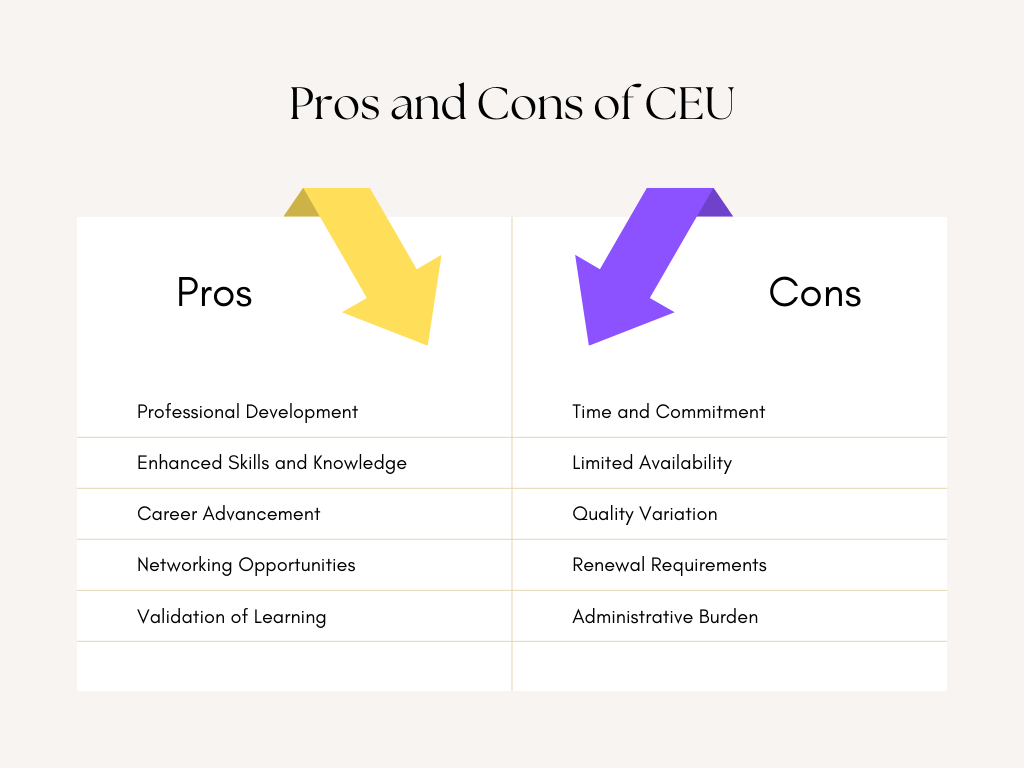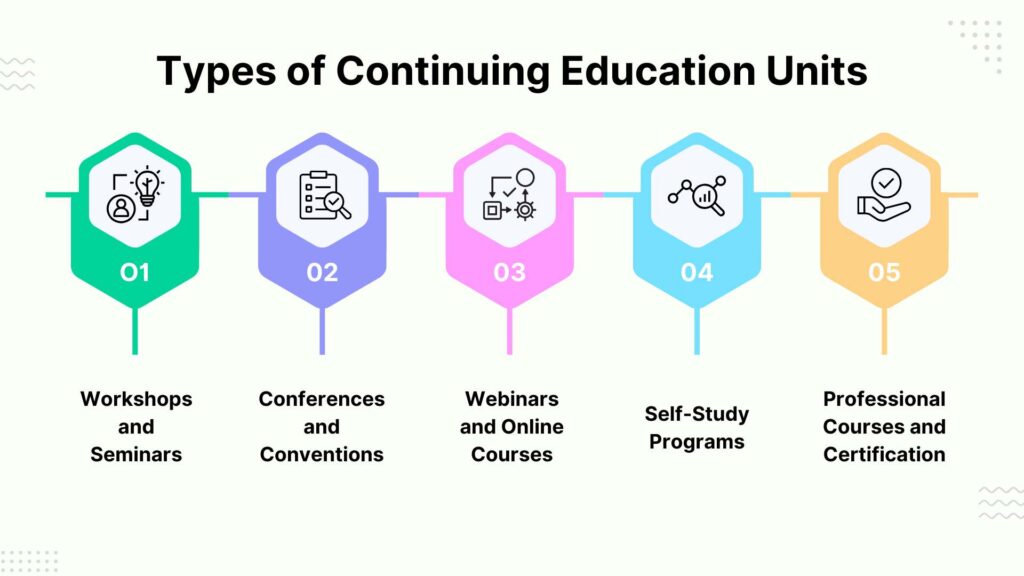What is CEU and what does a Continuing Education Unit mean? The Continuing Education Units (CEUs) have become an in-demand mechanism for professionals working in different industries to effectively develop their skills keeping up with modifications and career growth. Consequently, the journey of lifelong learning has become more important than it has ever been while the work environments are fast-changing now. In this blog post, we will look deeply into the core of Continuing Education Units (CEUs), discussing their meaning, importance, and both their pros as well as cons.

Continuing Education Unit (CEU)
A Continuing Education Unit (CEU) is the unit used in the measurement of participation in the nonformal learning program. CEUs are normally awarded to specialists in different areas of work as a professional way to show your recently acquired knowledge and understanding. CEU aims to motivate workers to engage in lifelong study and keep pace with the latest advances, methods, and latest technology in their fields. The contact hours are designed to be a measure of other types of activities, such as continuous education certificates or initial training.
One CEU usually equals 10 documented contact hours of involvement in continuing education activities offered by a structured program. Contact hours are meant time be spent on lectures, seminars, training sessions, or other beneficial educational activities. To illustrate, working in a workshop for that specific period or completing a language course online yields the participants the CEUs they need.
Most professions are controlled and managed by the different organizations and employers’ bodies that require the professionals to undergo the grade of Continuing Education Units (CEU) in a specified period to be able to maintain their certifications, licensure, or jobs. CEUs provide a means of assessing and keeping records on how people’s job-related skills are constantly updated and refreshed.
CEUs can be obtained from a different number of continuing education assets such as workshops, seminars, conferences, webinars, online courses, self-study programs, and other professional development events respective to the topic.
The CEU records are normally retained by the organizations that offer CEUs and this documentation may be used as proof of an individual’s participation or the completion of the CEU activities. Participants might obtain a document of certification or transcript indicating the CEUs they gained while their progress is monitored. You may question what are professional certifications. This document can be used as proof that the individual put in efforts for continuing education if needed.
Professional certificates and licenses may be required to be renewed periodically via tests and attendance to continued education training. Continuing Education Units (CEUs) are a common requirement for renewal and recertification processes.
Organizations that have CEU standards usually have established criteria and requirements for certifying and accrediting CEU courses. This consequently enables the educational activities to be of a high standard that is considered relevant and useful to the career development needs of the participants.
Pros and Cons of CEU
Continuing Education programs are beneficial for those professionals who look for ways of enhancing their knowledge and skills. They learn how to earn CEU credits and cEU certification. However, CEU has drawbacks as well, and to understand better the true advantages and disadvantages of continuing education units, let’s mention some of them and discuss them.
Here are some continuing education benefits:
- Professional Development: CEUs enhance the capacity of professionals to persist in learning all through their lifespan to stay relevant to the changes, trends, and top practices in their chosen trade.
- Enhanced Skills and Knowledge: CEU education gives opportunities to sharpen the skill set and widen the scope of expertise and equipment with the most updated knowledge. It can make professionals perform their job more effectively.
- Career Advancement: Professionals who pursue CEUs are generally perceived as more knowledgeable, which could increase their competitiveness in a job as it gives them a higher chance to advance their careers, promotions, and salary increases.
- Certification: Numerous jobs and job certifications require professionals to earn a minimum number of CEU credits over a predetermined period to continue in their positions. The CEUs are a way of ordering in which the professionals fulfill those requirements (keep their license or certification) and get professional certification.
- Networking Opportunities: CEU activities usually are accompanied by a chance for the workers to form professional associations with their peers and leaders of the field, which serves as the basis for collaboration, knowledge exchange, and networking.

Here are some cons of CEUs:
- Time and Commitment: Such CEU programs require a notable share of time and energy, which can be difficult to ensure for professionals engaged in busy schedule functions or have relationships.
- Price: Some CEUs are paid and require extra registration, tuition, materials, transportation, and manpower. Although these expenses are impossible to be afforded by a person who has a limited financial situation.
- Limited Availability: Depending on the nature of your work or business, it could be that fewer CEUs will be available, especially if you are in a restricted area that might be impossible to access. The external problem professionals face is just to get all relevant CEU programs that match their particular requirements and interests.
- Quality Variation: Educational quality and CEU rating are very diverse, from serious and well-rated teaching units to insubstantial and mediocre ones. Experts have been advised to treat course accreditation, institute rating, and relevance with every class they enroll in carefully.
- Renewal Requirements: Renewal of these sorts of credits is required by many practitioners either annually or on a five-year basis to keep their license or certification. Taking renewal credit units may be challenging especially when its programs are not readily available or not more easily accessible.
- Administrative Burden: Continuing Education Units (CEUs) tracking and documentation, record keeping, and submitting evidence of attended participation become a burden for professionals, especially, when they are accompanied by punishment for latecomers or very strict guidelines of documentation.
Types of Continuing Education Units
There are different types of continuing education opportunities for professionals in various fields. Some of them include:
- Workshops and Seminars
Workshops and seminars are training courses or sessions that are relative; they focus on certain subjects or skills. Such platforms usually have keynote speakers, practical activities, and occasions for open discussion and networking as features.
- Conferences and Conventions
Conferences and conventions are places where representatives from a given area of specialization or industry congregate this platform is utilized to exchange knowledge, ideas, and information about modern development trends through keynote addresses, panel discussions, workshops, and exhibitor stands.
- Webinars and Online Courses
Participation in webinars and online courses will yield an impression of convenience for professionals as instead of leaving their desks and going to a lecture, they can continue their education right from their workplace. They are not confined by time and space; among the covered topics, they may be live or recorded presentations, interactive exercises, and discussions.
- Self-Study Programs
These programs facilitate the learning process and turn it into a more flexible and expanding one because professionals can follow their pace and establish their own study time. The level of resources required for these programs may encompass reading assignments, online units, videos, exercises, and other sources that professionals can use anytime to gain new knowledge and skills.

- Professional Certification
Certification programs are structured educational programs that provide a credential to validate professionals’ competency in a certain career realm. Joining an approved program will often require the learner to satisfy some basic prerequisites.
- Professional Courses
Online learning courses cover a wide range of topics that include career advancement, leadership development, communication skills, project management, and other subject areas that are taken into account by careers and personal or organizational responsibilities.
- In-House Training Programs
Most companies provide training by themselves or training courses fit for their staff’s situation. The focus of these programs can be diverse. Such conditions may involve the relevant policies, processes, systems, or skills that best guide employees in their job position.
- Industry-Specific Training
Some industries have such kind of training programs or certificates which are specially made for the individual character and regulation of the industry. Examples may be educational certifications for healthcare workers, safety training for building site workers, and financial industry certifications.
- Externships and Internships
Other extra money education like externships and internships are the places where practitioners can get the experiences that are practical and can offer the skills and knowledge while working in a real workplace. Such chances are most frequently linked with a supervised job experience through a partnership with an industry partner for example.
- Educational Conventions
Educational conferences and expos give a showcase of the newest educational resources and technologies available to professionals working in different fields. These events may consist of keynote speakers, demonstrations, exposition areas, and meet-greet sessions.
These are some of the types of continuing education units (CEUs) that are for professionals. Certain coursework, electives, or general university education (CEU) provisions will likely depend on the profession, the industry, the regulatory requirements, and individual learning tastes.
Conclusion
Thus, CEUs are irreplaceable and are important in ongoing education, professional growth, and development. People participating in continuing education courses and CEU tests are not only broadening their knowledge and skills with new advancements but also indicating that they are keeping up with competence in their fields. Professionals get structured feedback as to what they need to do to improve their skills, get new credentials, and move their career forward either through workshops, online courses, or any other learning activities but, at the same time, CEUs provide a structured pathway for professionals to stay current, enhance their credentials, and advance their careers.